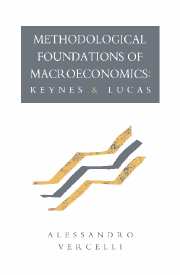Book contents
- Frontmatter
- Contents
- Preface
- List of abbreviations
- 1 Introduction
- Part 1 Methodological foundations of macroeconomics
- Part II Keynes after Lucas
- 8 Lucas's scientific paradigm
- 9 Lucas's heuristic model
- 10 The real equilibrium business cycle and Lucas's attempt at a synthesis
- 11 Keynes's heuristic model: general observations
- 12 Money and production in Schumpeter and Keynes: two dichotomies
- 13 Keynes's heuristic model: methodological aspects
- 14 Conclusions
- References
- Subject index
- Author index
10 - The real equilibrium business cycle and Lucas's attempt at a synthesis
Published online by Cambridge University Press: 05 January 2012
- Frontmatter
- Contents
- Preface
- List of abbreviations
- 1 Introduction
- Part 1 Methodological foundations of macroeconomics
- Part II Keynes after Lucas
- 8 Lucas's scientific paradigm
- 9 Lucas's heuristic model
- 10 The real equilibrium business cycle and Lucas's attempt at a synthesis
- 11 Keynes's heuristic model: general observations
- 12 Money and production in Schumpeter and Keynes: two dichotomies
- 13 Keynes's heuristic model: methodological aspects
- 14 Conclusions
- References
- Subject index
- Author index
Summary
We will not postulate the existence of states of equilibrium where none exists, but only where the system is actually moving toward one. When, for instance, existing states are in the act of being disturbed, say by a war financed by government fiat, or by a ‘mania’ of railroad building, there is very little sense in speaking of an ideal equilibrium coexisting with all that disequilibrium. It seems much more natural to say that while such a factor acts there is no equilibrium at all. When it has ceased to act, and when we observe that readjustment sets in which we interpret as a movement toward equilibrium, then and only then the ideal equilibrium becomes the goal of an economic process, the nature of which can be elucidated by reference to it. Then and only then the ideal equilibrium becomes what we have called it before, the ‘theoretical norm’ of the economic variables.
(Schumpeter, 1939, p. 70)Introduction
In the eighties new classical economists split on many fundamental issues. Branching is typical of any evolutionary process in nature as well as in the history of science. The same thing has happened to the Keynesian school, and indeed to most successful schools in the history of economic thought. The identification of the different branches is becoming increasingly difficult, and is very sensitive to different definitional criteria. Even the boundaries of the school are not easy to locate.
Information
- Type
- Chapter
- Information
- Methodological Foundations of MacroeconomicsKeynes and Lucas, pp. 163 - 175Publisher: Cambridge University PressPrint publication year: 1991
